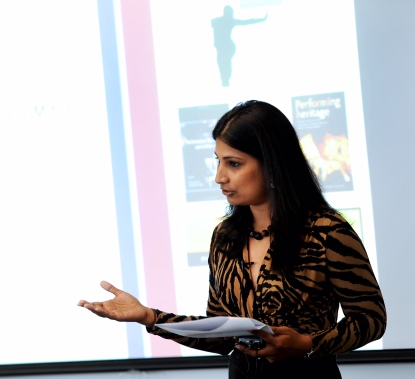
Cover Image Designed by Sylwia Dobkowska & Photograph by Richard Haughton
Winner of 2017 de la Torre Bueno First Book Award awarded by Dance Studies Association (DSA)
Runner-up for the Theatre & Performance Research Association (TaPRA) New Career Research in Theatre/Performance Prize 2016
Akram Khan: Dancing New Interculturalism analyses the relationship between this seminal British-Asian dancer/choreographer’s complex identity-positions and his art through the lens of ‘new interculturalism’. Through seven key case studies from Khan’s oeuvre, this book demonstrates how Khan’s philosophy and aesthetic of ‘new interculturalism’ is a challenge to the 1980s predominantly western ‘intercultural theatre’ project, as a more nuanced and embodied approach to representing Othernesses, from his own position of the Other. Additionally, the book challenges popular perception of Khan’s art as contemporary South Asian dance by suggesting that, instead, Khan uses South Asian dramaturgical principles to transform the western contemporary dance landscape in intercultural ways. Offering the first full-length investigation of Akram Khan’s work, this book is essential reading for students, researchers, practitioners and fans of Khan’s work.
What Other Academics Are Saying About It:
“The Bueno First Book prize is awarded to Royona Mitra for Akram Khan: Dancing New Interculturalism. As her title suggests, Mitra argues for a rethinking of the disputed term ‘intercultural’ through an in-depth and insightful analysis of Khan’s performances and choreography. This well-researched and eloquently written book considers Khan’s work within the context of ‘Britishness’ and ‘cool Britannia’ as espoused by Tony Blair’s Labour government (1997-2010). Mitra situates herself and Khan as British-based Bengalis during this period, both trained in the South Asian dance form, kathak, and in what she describes as a “multi-corporeal performance training”. She offers a nuanced account of her encounters with release technique, contact improvisation, capoeira and physical theatre, and of her physicalized conflicts between verticality and horizontality; gravity and body weight; and the role of the spine in such intercultural negotiation. Through a sophisticated analysis of seven of Khan’s works spanning 1999 to 2014 and also of his choreography for the 2012 London Olympics, Mitra applies a multilayered lens to trouble the complex relationships at play in British multiculturalism, identity politics and contemporary performance. In so doing, she considers the body as a site of political intervention and how Khan queers contemporary dance as a South Asian man. In this first book- length study of Khan’s work, Mitra offers new ways to understand his politicized aesthetic – “his desire to communicate personal politics through a corporeal language” – and she undertakes a thorough investigation of the complex relationships between postcolonialism, sexuality and gender. She articulates what makes Khan’s interculturalism ‘new’ and how it is manifest in his art, “both as a political and philosophical stance and a performance aesthetic”. Through a critical analysis of diaspora, interculturalism, identity, and hybridity in the work of Akram Khan, Mitra forces dance scholars to examine the broader context and implications of contemporary dancemaking within global economies of culture.”
DSA Book Awards Committee
“This is a “go to” book on Khan which will stimulate teaching on the many different dance courses that are established (and still emerging) in HE. But it is much more than that in its focus and claims for Khan’s “new” interculturalism, and in its fearlessness in confronting issues around identity politics: poverty, wealth, homelessness, global belonging, and the privileges that Khan (and those of us who have multiple places we feel ‘at ‘home’ in, belong to) can enjoy and which enable him to develop his work. We were particularly impressed by Mitra’s own location of her position within the work, showing us the development of her critical journey from the inside, from the subjective position of ‘knowing’ and ‘being’, to illuminate the issues still further for readers whether they are outside looking in or fellow insiders looking out and reflecting back that experience – in both directions. Mitra sets out the critical field from which her terms are based in an informative and even-handed way that is both thoroughly scholarly and convincing.”
TaPRA New Careers Prize Judges
“Provocative, eloquent and insightful Akram Khan: Dancing New Interculturalism skilfully captures the complicated ‘dance’ of migrant, border, diasporic identities through Khan’s work as he negotiates the center of western thought and culture by challenging and reshaping it. Mitra writes elegantly and intelligently, with a lucid grasp of the complex realms of postcoloniality, sexuality, and gender in its embodied form and an ability to lithely translate it into intercultural, social, and racial terms. […] Her reading of Khan’s new interculturalism makes an original and profound commentary on how dance embodies and engenders third spaces in between nation state formation. This should be read not only by dance and theatre scholars but also by postcolonial, and globalization theorists alike.”
Professor Priya Srinivasan, Leiden University, Netherlands
“Original, insightful, and nuanced, Royona Mitra’s Akram Khan: Dancing New Interculturalism investigates Khan’s politicized aesthetic as part of an emerging phenomenon of new interculturalism in performance. Rather than representing Khan’s choreography as fusion or as innovation, Mitra argues that his work problematizes and destabilizes atomized, homogeneous categories of contemporary and classical, Western and South Asian. […] With a keen eye for the detail of specific dance works, Mitra shows us that Khan’s embodied interculturalism exemplifies the complexity of the present-day British and global experience. Skillfully argued, well researched, and beautifully written, this book is a welcome addition to the literature in dance and performance studies as well as to writings on contemporary British identity.”
Professor Janet O’Shea, University of California, Los Angeles, USA
